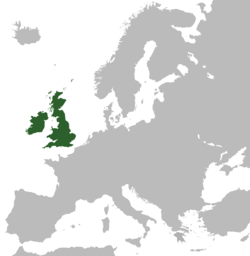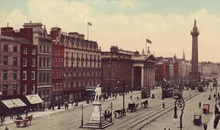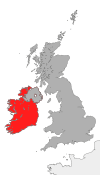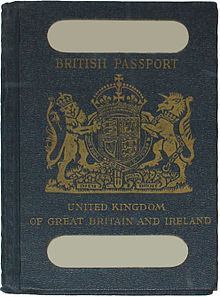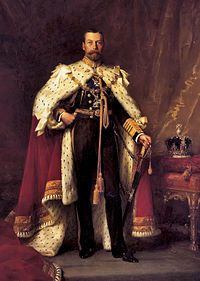
United Kingdom of Great Britain and Ireland
Background to the schools Wikipedia
SOS Children volunteers helped choose articles and made other curriculum material A quick link for child sponsorship is http://www.sponsor-a-child.org.uk/
| United Kingdom of Great Britain and Ireland1 | ||||||
| Sovereign state | ||||||
|
||||||
|
||||||
| Motto Dieu et mon droit (French)3 "God and my right" |
||||||
| Anthem God Save the King (Queen) |
||||||
| Capital | London | |||||
| Languages |
|
|||||
| Government | Constitutional monarchy | |||||
| Monarch | ||||||
| - | 1801–1820 | George III | ||||
| - | 1820–1830 | George IV | ||||
| - | 1830–1837 | William IV | ||||
| - | 1837–1901 | Victoria | ||||
| - | 1901–1910 | Edward VII | ||||
| - | 1910–19272 | George V | ||||
| Prime Minister | ||||||
| - | 1801, 1804–1806 | William Pitt the Younger | ||||
| - | 1924–1927 (In name-cont.) | Stanley Baldwin | ||||
| Legislature | Parliament | |||||
| - | Upper house | House of Lords | ||||
| - | Lower house | House of Commons | ||||
| History | ||||||
| - | Act of Union 1800 | 1 January 1801 | ||||
| - | Anglo-Irish Treaty | 6 December 1922 | ||||
| - | Formal name changed | 12 April 1927 | ||||
| Area | ||||||
| - | 1801 | 315,093 km² (121,658 sq mi) | ||||
| Population | ||||||
| - | 1801 est. | 16,345,646 | ||||
| Density | 51.9 /km² (134.4 /sq mi) | |||||
| - | 1921 est. | 42,769,196 | ||||
| Density | 135.7 /km² (351.6 /sq mi) | |||||
| Currency | Pound sterling | |||||
| Today part of | ||||||
| 1 Cornish: Rywvaneth Unys Breten Veur ha Iwerdhon; Irish: Ríocht Aontaithe na Breataine Móire agus Éireann; Scots: Unitit Kinrick o Great Breetain an Irland; Scottish Gaelic: Rìoghachd Aonaichte na Breatainne Mòire is Èireann; Welsh: Teyrnas Unedig Prydain Fawr ac Iwerddon. 2 The Irish Free State seceded from the United Kingdom in 1922 as a result of the Irish War of Independence and the subsequent Anglo-Irish Treaty, but this fact was not reflected in the long-form name of United Kingdom (and the monarch's title) until the Royal and Parliamentary Titles Act in 1927. 3 The Royal motto used in Scotland was Nemo Me Impune Lacessit (Latin for "No-one provokes me with impunity"). |
||||||
The United Kingdom of Great Britain and Ireland was the formal name of the United Kingdom between 1801 and 1927. In 1922, the majority of Ireland seceded to form the Irish Free State. The Royal and Parliamentary Titles Act 1927 amended the name of the Parliament of the United Kingdom to reflect the change in the country's boundaries, and the Act is conventionally considered to mark the point when the name of the state changed as well.
The United Kingdom of Great Britain and Ireland came into being on 1 January 1801 under the terms of the Acts of Union 1800, by which the formerly separate kingdoms of Great Britain and Ireland were united. The Kingdom of Great Britain had itself been formed in 1707 by the union of the formerly separate kingdoms of England and Scotland.
In 1919, the majority of Irish MPs refused to recognise the Parliament of the United Kingdom and formed a unilaterally independent Irish parliament, Dáil Éireann, with an executive under the President of Dáil Éireann, Eamon de Valera. A War of Independence was fought between 1919 and 1921. Finally in December 1922, twenty-six of Ireland's counties exited from the United Kingdom of Great Britain and Ireland and formed an independent Irish Free State. The southern part of Ireland that seceded from the union is today the Republic of Ireland. It covers the same territory as the Free State, but adopted a new constitution in 1937.
Six counties of Ireland, called Northern Ireland, remained a part of the continuing United Kingdom, which was renamed the United Kingdom of Great Britain and Northern Ireland in 1927, in accordance with the Royal and Parliamentary Titles Act 1927. The present-day United Kingdom retains the same constitutional and parliamentary systems but covering only a portion of the previous territory.
Acts of Union
Despite being a kingdom in its own right, Ireland before 1801 did not have full sovereignty. The Kingdom of Ireland was a settler state, with the King of Ireland being the same person as the King of England (and, since the 1603 ascension of the Stuart dynasty, the King of Scotland). Its government was headed by a Lord Lieutenant and his Chief Secretary, who were responsible to the government of Great Britain rather than to the Parliament of Ireland. Before the Constitution of 1782, the Irish parliament was also severely fettered, and decisions in Irish courts could be overturned on appeal to the British House of Lords in London.
Ireland gained a degree of independence in the 1780s thanks to Henry Grattan. During this time the effect of the penal laws on the majority Catholic population was reduced, and Catholics were given the vote in 1794; however, they were still excluded from becoming members of the Irish House of Commons. This brief period of limited independence came to an end following the Irish Rebellion of 1798, which occurred during the British war with revolutionary France. The British government's fear of an independent Ireland siding against them with the French resulted in the decision to unite the two countries. This was brought about by legislation in the parliaments of both kingdoms, and came into effect on 1 January 1801.
The Irish had been led to believe by the British that their loss of legislative independence would be compensated for with Catholic Emancipation, i.e. by the removal of civil disabilities placed upon Roman Catholics in both Ireland and Great Britain. However, King George III was bitterly opposed to Catholic Emancipation, and blocked his government efforts to introduce it.
Ireland under the Union
Ireland was never fully integrated into the British state or political culture. Despite losing its own parliament, much of the system of government in Ireland remained in place after the union: the offices of Lord Lieutenant and Chief Secretary remained (although the latter came to eclipse the former), as well as the Privy Council of Ireland and the various government departments. Ireland retained its own legal system, and its own courts; though the House of Lords in London resumed its place as a court of appeal. The retention of laws and courts in Ireland was paralleled with the position of Scotland under the union, which continued its own legal system. The main difference from Scotland was in religious policy and demography. While the majority of the Irish were Catholic, England and Scotland were both predominantly Protestant.
The question over how the British state should respond to Irish demands, called "the Irish question" was a major influence on British politics throughout the long nineteenth century. In 1844, future British prime minister Benjamin Disraeli described the situation in Ireland:
A dense population, in extreme distress, inhabit an island where there is an Established Church, which is not their Church, and a territorial aristocracy the richest of whom live in foreign capitals. Thus you have a starving population, an absentee aristocracy, and an alien Church; and in addition the weakest executive in the world. That is the Irish Question.'—Hansard
Early Irish opposition to the Union
In the context of rising national awareness in Ireland, there were several inter-related popular campaigns against British policy in Ireland in the first half of the nineteenth century.
Catholic Emancipation was finally brought about in 1829, following a campaign led by Daniel O'Connell. O'Connell had been elected as Member of Parliament for County Clare, but had been prevented from taking his seat in the British House of Commons at Westminster because of the requirement to swear the Oath of Supremacy; the oath had been expressly worded to prevent Roman Catholics from entering parliament.
O'Connell had also campaigned for "Repeal", i.e. for the repeal of the Acts of Union and a return to Ireland's position under the Constitution of 1782. O'Connell was an early leader of Irish nationalism. He wrote in 1842, "I am not British", and also declared Ireland a "separate nation".
British thinkers tried to respond to these demands, but philosopher John Stuart Mill struggled to think of the Irish as a separate nation, and feared any such recognition's implications for Britain. Most English elites assumed their ways were superior and the Irish were not their equals but merely as "degraded caste". Ireland was in the Union, but still felt and was treated as separate. British ministers of the Crown rarely visited Ireland, and delegated their authority to the Irish secretary, Ireland's sole voice in the cabinet.
More demands from Ireland for the re-establishment of its own parliament were to be repeated through the course of the 19th century, building up until the Irish Home Rule movement came to dominate Irish politics from the late 1870s onwards.
Campaign for Irish Home Rule
Irish demands ranged from the "repeal" of O'Connell, the "federal scheme" of William Sharman Crawford (actually devolution, not federalism as such), to the Home Rule League of Issac Butt. Despite the Great Irish Famine of 1845 to 1852, Ireland was not any closer to home rule by mid-century, and rebellions in 1848 and 1867 failed.
O'Connell's moderate parliamentary campaign was blocked by the limited scope of the franchise in Ireland. The wider the franchise was expanded, the better anti-Union parties were able to do in Ireland. Running on a platform that advocated something like self-rule that have been given to Canada under the British North America Act, 1867, the Home Rulers won a majority of both county and borough seats in Ireland in 1874. By 1882, leadership of the Home Rule movement had passed to Charles Stewart Parnell of the Irish Parliamentary Party.
A wider franchise also changed the ideological mix among non-Irish MPs, making them more receptive to Irish demands. The 1885 election resulted in a hung parliament in which the Irish Parliamentary Party held the balance of power. They initially supported the Conservatives in a minority government, but when news leaked that Liberal Party leader William Ewart Gladstone was considering Home Rule, they ousted the Conservatives and brought the Liberals to office.
Gladstone's First Home Rule Bill was closely modelled on the self-government given to British settler colonies, starting with the Act of Union 1840 (also called the "Canada Act"), and especially the British North America Act, 1867. Irish MPs would no longer have a vote in Westminster but in a separate Dublin parliament, which would control all areas except foreign and military affairs, which would remain with Britain. Gladstone's proposals did not go as far as Irish nationalist opinion desired, but were too radical for both Irish and British unionists: his First Home Rule Bill was defeated in the House of Commons following a split in his own party. Gladstone took the issue to the people in the 1886 election, but the unionists (Conservatives plus Liberal dissenters) held a majority over the Home Rule coalition (Liberals and Irish nationalists). Significantly, pro-Home Rule parties won majorities in Ireland, Scotland, and Wales, but not in England, where most seats were contested.
Before the 1892 election, Parnell was caught in one of the "one of the most celebrated sex scandals of the century", which caused Gladstone to disavow him, and split the Irish Parliamentary Party. Nevertheless, the 1892 election gave the pro-Home Rule forces a narrow majority, and again the Liberals had done better in Scotland and Wales than in England. Gladstone introduced a Second Home Rule Bill in 1893, which this time would have kept Irish MPs in the British parliament, but it was defeated (as was expected) in the Conservative-dominated House of Lords.
Home Rule in the balance
With the Conservatives opposed to Home Rule, it slipped from the mainstream of British politics once they came into power in the 1890s. However, the Conservative government also felt that the demands for Home Rule were essentially materialist in origin, and that to improve conditions in Ireland would satisfy opinion there; this has been described as "killing home rule with kindness". Reforms passed as a result included the Local Government (Ireland) Act 1898 and the Wyndham Land Act.
Outside of constitutional change, the British state tried other methods to placate Ireland. Between 1868 and 1908: spending on Ireland was generally increased, huge tracts of land were purchased from landlords and redistributed to smallholders, local government was democratised, and the franchise widely extended. The ending of so many social and economic grievances did not end Irish disenchantment, however. What this did accomplish was a simplification of the issues. No longer could British governments fool themselves into thinking that something other than satisfying Irish demands for national recognition and self-determination would answer the Irish question.
Some Britons were beginning to accept Irish nationalism as legitimate. British liberal support for home rule rested on the premise that the Irish people had withdrawn their consent to be governed by the United Kingdom by electing the Nationalists to repeated majorities, and the popular consent was a basic prerequisite for morally legitimate government. In other words, for liberals it was immoral to hold the Irish in the Union against their will.
The competing idea among unionists was that it was impossible to give Ireland independence or it would be used as base from which Continental powers could attack Britain. Writing much later, after Irish independence, Winston Churchill stated that this idea had taken on the status of dogma and had fossilised in British minds longer after it had ceased to have any basis in fact and that only the "large outside shock" of the First World War had changed this.
The Liberals regained power in 1905. Following a confrontation with the House of Lords over the " People's Budget", a wider constitutional conflict developed, resulting in two general elections during 1910. The second in December 1910 saw the Liberals lose seats in the Commons, necessitating the support of the Irish Parliamentary Party, now led by John Redmond. Redmond, holding the balance of power in the Commons, renewed the old "Liberal Alliance" this time with H. H. Asquith as Prime Minister. For budget reasons, Asquith had no choice but to agree to a new Home Rule Bill and the removal of the veto power of the Lords with the passage of the Parliament Act 1911. The Irish party saw their support repaid by the introduction of the Home Rule Bill, which with the removal of the House of Lords' veto power by the Parliament Act became a clear possibility for the first time.
The Third Home Rule Bill, introduced in 1912, provoked increasingly bitter opposition from unionists, particularly those in Ulster. The Bill finally passed into law as the Government of Ireland Act 1914 a few weeks after the start of the First World War, but its implementation was simultaneously suspended for the duration of the war. The situation in Ireland had deteriorated severely, with both unionist Ulster Volunteers and nationalist Irish Volunteers openly drilling, and with both groups having imported arms. The war exacerbated tensions further, with unionists urging volunteers to join local units of the New British Army, but nationalists much more ambivalent about a war that was seen by many as Britain's and not Ireland's conflict.
The 1916 Easter Rising in favour of an independent Irish Republic was suppressed without great difficulty by the British, but the severe measures taken by them in its aftermath further alienated nationalist opinion. After the rebellion, the British Cabinet urgently decided in May 1916 that the 1914 Act should be brought into operation immediately and a Government established in Dublin. Asquith tasked Lloyd George, then Minister for Munitions, with opening negotiations between Redmond and Carson. Redmond and Carson came very close to reaching a deal, but ambiguities of the wording of the final document were purposely intrigued by Walter Long to jeopardise Home Rule. Redmond broke off negotiations when he realised partition was not to be temporary as he had been led to believe.
A second attempt to introduce the Act was made by the Prime Minister Lloyd George in 1917 when he called together all parties within Ireland to decide their future at an Irish Convention; however, after six months the Convention failed to reach agreement on the important question of whether Ulster was to be under the authority of any new Dublin parliament. The European situation with the threat of conscription (which had been operating in Great Britain but had not yet been introduced into Ireland) changed the political climate further, such that in the 1918 general election, the Irish Party lost most of its seats to the more radical Sinn Féin party.
Anglo-Irish War
In 1919, Sinn Féin MPs elected to Westminster formed a unilaterally independent Irish parliament in Dublin, the first Dáil Éireann with an executive under the President of Dáil Éireann, Éamon de Valera. A War of Independence was fought between 1919 and 1921. The island of Ireland was partitioned on 3 May 1921 under the Government of Ireland Act 1920 into two distinct autonomous United Kingdom regions, Northern Ireland and the short-lived Southern Ireland. On 6 December 1922, a year after the Anglo-Irish Treaty was signed, the entire island of Ireland effectively seceded from the United Kingdom of Great Britain and Ireland and formed a new dominion, the Irish Free State. As was widely expected, however, Northern Ireland immediately exercised its right under the Anglo-Irish Treaty, to opt out of the Irish Free State. On 7 December 1922 (the day after the establishment of the Irish Free State) the Parliament of Northern Ireland resolved to make an address to King George V to opt out of the Irish Free State. If Northern Ireland had not done so it would have become an autonomous part of the Irish Free State. With the King's acceptance of the petition, the Irish border became an international frontier.
The surviving Union of Great Britain with part of Ireland continued to be called the "United Kingdom of Great Britain and Ireland" until 1927, when it was renamed the "United Kingdom of Great Britain and Northern Ireland" by the Royal and Parliamentary Titles Act 1927.
Partition of Ireland
The Anglo-Irish Treaty was given effect in the whole of the British Isles through the Irish Free State Constitution Act 1922. That Act established a new Dominion for the whole island of Ireland but also allowed Northern Ireland to opt out of it. Under Article 12 of the Treaty, Northern Ireland could exercise its opt out by presenting an address to the King requesting not to be part of the Irish Free State. Once the Treaty was ratified, the Houses of Parliament of Northern Ireland had one month to exercise this opt out during which month the Irish Free State Government could not legislate for Northern Ireland, holding the Free State's effective jurisdiction in abeyance for a month.
On 7 December 1922 (the day after the establishment of the Irish Free State) the Houses of Parliament demonstrated its lack of hesitation by resolving to make the following address to the King to opt out of the Irish Free State:
MOST GRACIOUS SOVEREIGN, We, your Majesty's most dutiful and loyal subjects, the Senators and Commons of Northern Ireland in Parliament assembled, having learnt of the passing of the Irish Free State Constitution Act, 1922, being the Act of Parliament for the ratification of the Articles of Agreement for a Treaty between Great Britain and Ireland, do, by this humble Address, pray your Majesty that the powers of the Parliament and Government of the Irish Free State shall no longer extend to Northern Ireland.
On 13 December 1922 Prime Minister James Craig addressed the Parliament of Northern Ireland, informing them that the King had responded to the Parliament's address as follows (the King having received it on 8 December 1922):
I have received the Address presented to me by both Houses of the Parliament of Northern Ireland in pursuance of Article 12 of the Articles of Agreement set forth in the Schedule to the Irish Free State (Agreement) Act, 1922, and of Section 5 of the Irish Free State Constitution Act, 1922, and I have caused my Ministers and the Irish Free State Government to be so informed.
Legacy
Despite increasing political independence from each other from 1922 and complete political independence since the new constitution of 1937, the union left the two countries intertwined with each other in many respects. Ireland used the Irish pound from 1928 until 2001 when the euro replaced it. Until it joined the ERM in 1979, the Irish pound was directly linked to the pound sterling. Decimalisation of both currencies occurred simultaneously on Decimal Day in 1971. Coins of equivalent value had the same dimensions and size until the introduction of the British twenty pence coin in 1982. British coinage, therefore, although technically not legal tender in the Republic of Ireland was in wide circulation and usually acceptable as payment, and vice versa. The new British twenty pence coin and later British one pound coin were the notable exceptions to this, as there was initially no equivalent Irish coin value, and when subsequently, Irish coins of these values were introduced, their designs differed significantly, thereby not allowing for 'stealth' passing of the coins in change.
Irish citizens in the UK have a status almost equivalent to British citizens. They can vote in all elections and stand for Parliament. British citizens have similar rights to Irish citizens in the Republic of Ireland and can vote in all elections apart from presidential elections and referendums. Under the Irish nationality law anyone born on the island of Ireland to a British or Irish parent can have Irish citizenship and so most children born in Northern Ireland can have a British or an Irish passport (or both). Before 2005 there was no requirement for one parent to be a British or Irish citizen and so all persons born on the island of Ireland before then are entitled to be Irish citizens.
List of monarchs
Until 1927, part of the monarch's royal title included the words King of the United Kingdom of Great Britain and Ireland. In 1927, the words United Kingdom were removed from the royal title so that the monarch was instead styled as King/Queen of Great Britain, Ireland...[and other places]. The words United Kingdom were restored to the monarch's title in 1953 with the reference to Ireland replaced with a reference to Northern Ireland.
- George III (1801–1820) (monarch from 1760)
- George IV (1820–1830)
- William IV (1830–1837)
- Victoria (1837–1901)
- Edward VII (1901–1910)
- George V (1910–1922) (title used until 1927)


